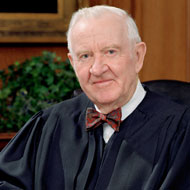 by Randall Morton, President, Founder, The Progressive Forum
by Randall Morton, President, Founder, The Progressive Forum
John Paul Stevens appeared at The Progressive Forum on November 16, 2010, at the age of 90. I was extremely nervous about the one-on-one interview, but he put me at ease with a joke. Backstage he asked to see the questions, which I thought was fine, all toward better answers. Emerging from his dressing room, I asked, "Sir, are there any questions I shouldn't ask?" He said, "Don't worry, I'll just change the question."
His Progressive Forum website page includes his remembrance of Babe Ruth's "called shot" home run in the 1932 World Series (he did call it!), same sex marriage, typical day at the Court, favorite rulings, why the Constitution works, career advice, and much more.
Here are things I learned that I haven't seen in the obituaries, including a famous Houston case.
He was known for his courtesy to lawyers who appeared before the Supreme Court. According to The New York Times, he didn't interrupt them. He said, "May I ask you a question?" The Times told a story about a nervous first-time attorney in front of the Court who started to answer a question from one of the Justices by saying, "Well Judge ..." Instead of Justice. Chief Justice Rehnquist corrected her twice on the same mistake as she became more nervous. After a third time, the Chief Justice leaned forward and said in his sternest voice yet, "Counsel is admonished that this Court is composed of Justices, not judges." And before the poor attorney could say anything, Justice Stevens interjected, "It's OK counsel, the Constitution makes the same mistake."
In World War II, he served in the Pacific theater in naval intelligence as a code-breaker, earning a Bronze Star.
He was an amateur Shakespearean who "ruled" on who actually wrote his sonnets. He was a private pilot who often flew to Washington from his home in Florida.
After the Watergate scandals, when President Gerald Ford was looking for a Supreme Court nominee, when personal integrity really mattered, he appointed John Paul Stevens.
In the Supreme Court term of 1947 and 1948, he clerked for the last of the Roosevelt appointees, Justice Wiley Rutledge. When drafting opinions at the time, Stevens argued that segregation was unconstitutional years before the Court reached the same conclusion in Brown v. Board of Education.
In writing opinions, he was unique among the Justices in writing his own first draft to critique his own thinking, rather than having his law clerks do it.
Justice Stevens' consistent leadership was the prime mover in opening up equal protection for gays and lesbians, which led to same-sex marriage and the right to serve in the military. In the landmark case that originated here in Houston, Lawrence v. Texas in 2003, the Court found Constitutional protection for sexual privacy and struck down the sodomy law in Texas. Typical of Stevens when building a majority coalition, he chose not to write the history making opinion, but to assign it to persuade a Justice to gain a swing vote. And that opinion contains what Justice Stevens himself had written 17 years earlier in a dissent when he was on the losing side of the same issue. What Stevens had authoritatively written 17 years before stood the test of time and became law.
Justice Stevens led the Court in overturning the Bush administration's efforts to evade legal restrictions by choosing Guantanamo Bay, Cuba, as a detention site, ruling that at Guantanamo, habeas corpus was still in effect.
He led the Court in upholding Roe v. Wade by affirming it in a case called Planned Parenthood of Southeastern Pennsylvania v. Casey in 1992, when he said, "Roe is an integral part of correct understanding of both the concept of liberty and the basic equality of men and women."
Stevens led the dissent in Bush v. Gore when he said, "Although we may never know with complete certainty the identity of the winner of this year's presidential election, the identity of the loser is perfectly clear. It is the nation's confidence in the judge as an impartial guardian of the rule of law."
At the end of his last term, Stevens led the dissent in Citizens' United v. Federal Election Commission which allowed corporations to spend freely in elections. He read his dissent from the bench saying, "While American democracy is imperfect, few outside the majority of this Court would have thought its flaws included a dearth of money in politics."
His memory is an inspiration.